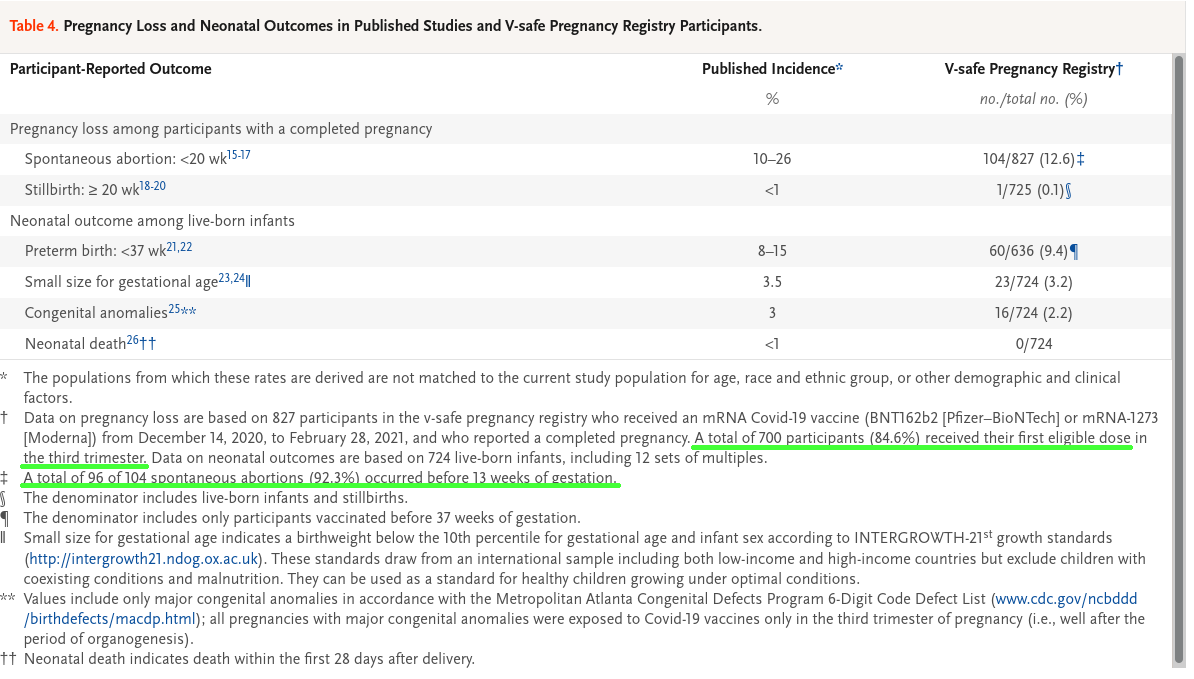Recently there have been videos making the rounds with a screenshot of table 4 (below) from the NEJM article Preliminary Findings of mRNA Covid-19 Vaccine Safety in Pregnant Persons. The data from that table suggests that there is a 76% to 100% miscarriage rate. 827 participants total, 700 had vaccination in third trimester, so 127 women who could have been getting the shot in the first or second trimester. 96 miscarriages in the first trimester. You do the math. Honestly, when I first heard this claim, and then skimmed the article, I was also pretty shocked-- the math checks out, it is all there in the 4th table, right? If you're in the same camp, then please read on.

Look at the dates in the second footnote. December 14th, 2020 till February 28, 2021. Two and a half months. Pregnancy takes 41 weeks on average (really, the 40 week figure is a century or more old, so if you're pregnant, and you've reached your due date, which still tends to be calculated on a 40 week assumption, don't worry), but this study only covered 11 weeks. Below is Table 3. The study looked at 1132 women who go the first dose in the first trimester, plus another 92 around the time of conception. So that means, those 96 miscarriages found during the time period of this study that occurred in the first trimester were out of the 1224 women who got the first dose by the end of the first trimester. That is 7.8% miscarriage rate. Different sources give the miscarriage rate as between 1 in 10 and 1 in 4. So does that mean the vaccine is safe for pregnant women? Scroll down for my concluding thoughts.

"As of March 30, 2021, the v-safe pregnancy registry call center attempted to contact 5230 persons who were vaccinated through February 28, 2021, and who identified during a v-safe survey as pregnant at or shortly after Covid-19 vaccination. [...] The registry enrolled 3958 participants with vaccination from December 14, 2020, to February 28, 2021"
So the follow-up was happening at most a month later. It is quite possible that even at that time, a great deal of those vaccinated in the first trimester were still in the first trimester of pregnancy at the time. So on the one hand, if the mRNA vaccines result in a miscarriage shortly after vaccination, these events should have been caught, and from the data, it doesn't seem to be an issue. If, however, getting vaccinated in the first trimester causes problems later in the pregnancy, that isn't known from this data. To actually come to conclusions about the safety of the vaccine with regard to pregnancy, all pregnancies would have to be followed to the end, which would require obviously nine months, and here we are, less than seven months after people began to get the first doses.
On the other hand, it is quite clear that the vaccine isn't an "abortion drug" causing massive amounts of miscarriages. The big takeaway is that if you come across a published article, and it seems like a hot, smoking gun, take a bit of time to let your head cool and carefully read the whole thing, perhaps even ask someone else "what am I missing here?" It happens, sometimes we miss the forest for the trees, but if something appears "too good to be true" or, in this case, "too horrible to be true", likely you're misunderstanding it.
